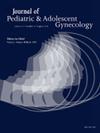6. A Rare Case of Premature Ovarian Insufficiency - Poirier-Bienvenu Neurodevelopmental Syndrome (POBINDS)
IF 1.7
4区 医学
Q3 OBSTETRICS & GYNECOLOGY
引用次数: 0
Abstract
Background
Poirier-Bienvenu neurodevelopmental syndrome (POBINDS) is an ultra-rare neurologic disorder characterized by early-onset seizures and impaired intellectual development. The majority of the 81 reported cases are children until puberty and their reproductive health was not discussed. A few studies in pubertal girls reported reproductive health problems: short stature, precocious or delayed puberty, and uterine agenesis.
Case
We present an 18-year-old woman with mild intellectual and developmental delays and almost normal psychomotor development, for whom a genetic diagnosis was established when applying for secondary amenorrhea. Three episodes of febrile convulsions have been documented during the patient's childhood. The timing of secondary sexual characteristics development was on time, with menarche at 10 years old. Her periods were regular with moderate bleeding. She was referred to a gynecologist because of secondary amenorrhea at 16 years old. The physical examination did not show any endocrine or metabolic disease. During a transabdominal ultrasound examination, the uterus hypoplasia was discovered. Hormone tests were performed: FSH 104,8 U/l, LH 45,06 U/l, TTH 1,499 mU/l, Prolactin 251,1 mU/l, Estradiol 57 pmol/l, Testosterone 1,51 nmol/l. The combination of elevated gonadotropins and low estradiol levels identifies hypergonadotropic amenorrhea and suggests premature ovarian insufficiency. The patient was referred to genetics for further evaluation. Because of multisystemic damage, growth retardation, and learning disabilities, without confirming a genetic diagnosis through previous chromosomal karyotype tests, targeted whole exome sequencing (WES) was performed. After WES was completed the patient was diagnosed with Poirier-Bienvenu neurodevelopmental syndrome (POBINDS).
Comments
Poirier-Bienvenu syndrome in literature is analyzed with a focus on epilepsy and neurodevelopment. The period of puberty and menstrual function in those patients is not discussed. This is the first clinical case to suggest that premature ovarian insufficiency is possible in POBINDS patients.
6. 卵巢功能不全- Poirier-Bienvenu神经发育综合征1例
背景:pobind是一种以早发性癫痫和智力发育障碍为特征的超罕见神经系统疾病。在报告的81例病例中,大多数是青春期前的儿童,他们的生殖健康没有得到讨论。一些对青春期女孩的研究报告了生殖健康问题:身材矮小,青春期早熟或延迟,以及子宫发育不全。我们报告一名18岁的女性,患有轻度智力和发育迟缓,精神运动发育几乎正常,在申请继发性闭经时,对其进行了基因诊断。在病人的童年时期有三次热性惊厥的记录。第二性征发育的时间是准时的,月经初潮在10岁。她的月经规律,有中度出血。她在16岁时因继发性闭经被转介给妇科医生。体格检查未发现任何内分泌或代谢疾病。经腹部超声检查发现子宫发育不全。激素检测:FSH 104、8 U/l, LH 45、06 U/l, TTH 1499 mU/l,催乳素251、1 mU/l,雌二醇57 pmol/l,睾酮1、51 nmol/l。促性腺激素水平升高和雌二醇水平低的结合确定促性腺激素高闭经,提示卵巢功能不全。该患者被转介到遗传学进行进一步评估。由于多系统损伤、生长迟缓和学习障碍,在没有通过先前的染色体核型试验确认遗传诊断的情况下,进行了靶向全外显子组测序(WES)。WES完成后,患者被诊断为pobinding神经发育综合征(pobinding)。对文献中关于癫痫和神经发育的sirier - bienvenu综合征进行分析。这些患者的青春期和月经功能没有被讨论。这是第一个提示pobinding患者可能出现卵巢功能不全的临床病例。
本文章由计算机程序翻译,如有差异,请以英文原文为准。
求助全文
约1分钟内获得全文
求助全文
来源期刊
CiteScore
3.90
自引率
11.10%
发文量
251
审稿时长
57 days
期刊介绍:
Journal of Pediatric and Adolescent Gynecology includes all aspects of clinical and basic science research in pediatric and adolescent gynecology. The Journal draws on expertise from a variety of disciplines including pediatrics, obstetrics and gynecology, reproduction and gynecology, reproductive and pediatric endocrinology, genetics, and molecular biology.
The Journal of Pediatric and Adolescent Gynecology features original studies, review articles, book and literature reviews, letters to the editor, and communications in brief. It is an essential resource for the libraries of OB/GYN specialists, as well as pediatricians and primary care physicians.

 求助内容:
求助内容: 应助结果提醒方式:
应助结果提醒方式:


